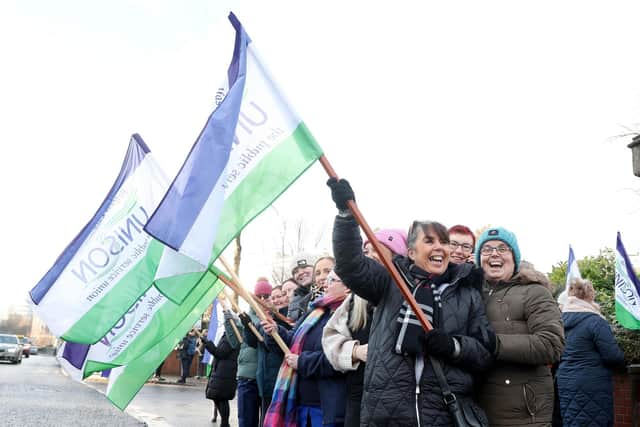Health workers to stage protest at Antrim hospital amid pay dispute as review body takes evidence
and live on Freeview channel 276
Each year, the government-sponsored NHS pay review body (PRB) collects evidence from a range of sources – including trade unions – and puts forward recommendations for a pay award for the 1.5 million people who work for the health service in England, Scotland, Wales and Northern Ireland.
It is then up to government ministers to decide whether to proceed with the recommended award.
Advertisement
Hide AdAdvertisement
Hide AdThis year’s recommended award, worth around 4-5%, has proved controversial with trade unions calling into question the pay review body’s independence.


The Unison and Nipsa trade unions – two of the largest in the health service in Northern Ireland – have now announced they are refusing to submit evidence.
A protest on Thursday morning at Antrim Area Hospital has been organised by the two unions to coincide with an evidence taking session by the PRB in the Northern health trust.
In a joint statement, a spokesperson for the two unions said: “Every year the trade unions and their members have duly given evidence around staff morale, cost of living issues, retention and recruitment and the issues around equal pay within the NHS.
Advertisement
Hide AdAdvertisement
Hide Ad“In return each year our members have received pay freezes or below inflation pay rises.
“We have provided information, warned and cautioned around the economy and labour market, agenda for change earnings and rewards, the Northern Ireland economy, devolution issues, service transformation, integration and productivity. We have discussed affordability and efficiency savings, workforce strategies and workforce numbers. We have discussed vacancies and shortages across all groups including nursing but also beyond this occupational group such as social work, domiciliary care, administration, support services etc.
“The supply and recruitment of staff is now at an all-time low and therefore we question why we should continue to engage with a body whose independence appears to be in name only. The actions of the UK government to curtail or cap any recommendations completely stands in the way of the PRB to respond in a manner that is meaningful. Unions are now questioning how the PRB can claim to act independently when they are tied to budgetary constraints.”
The spokesperson added: “The government needs to negotiate with us directly.”